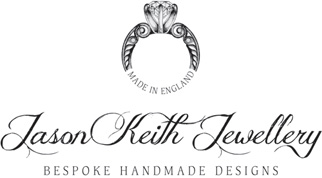WEDDING RING GUIDE
Buying a wedding ring is an investment that you get to see every day and that demonstrates your love and commitment for another. Its meaning is so important that it is essential to get it right, so we have written a wedding ring guide to help you choose your perfect wedding ring.
Traditionally a plain band is worn, but the possibilities are endless. Our wedding ring guide aims to touch upon a few options and some of the decisions to be made.
What Metal?
Jason Keith works with both gold and platinum. A good starter point would be to choose a colour and often based on what your partner already wears. The options include yellow, rose or white. The most popular trend at the moment is white (White Gold or Platinum).

Coloured Golds
Yellow, rose and white gold are all ‘real’ gold. When gold is used to make jewellery, pure gold is not used as it is too soft. Instead alloys of other metals such as silver, palladium and coper are added to it. It is the type of alloy used that determines the gold’s colour. All colours retain the same percentage of pure gold and therefore both their cost and quality characteristics are very similar. The percentage of pure gold determines the carat (not to be confused with carat, a diamonds weight).

Carat Gold
Jason Keith recommend using 18 carat (18ct) gold, it contains 75% pure gold and is the best quality for making rings.
If a cheaper option is specifically requested, we can use 9ct (which is 38% pure gold).
Higher carats such as 22ct are too soft for making diamond jewellery and so are not recommended.

Platinum Vs White Gold
In short, platinum is a more precious, hardwearing, heavier and expensive metal than white gold. It also remains white and shiny for its lifetime unlike white gold.
The process of making white gold ‘white’ includes a plating of rhodium. This plating gives white gold a better initial shine in comparison to platinum, however, this plating wears off over time. As white gold is made from pure gold, as the plating wears off a tinge of yellow will be seen. We therefore recommend that white gold is re-plated approximately every 18 months.
Profile | Width, depth and Shape
You will need to decide what profile you would like. Comfort and style are the key variables in aiding your decision. Depth, width and shape of the band can be variable with a larger width and bigger depth resulting in less comfort and increasing the price tag. All attributes can be balanced against the style you’re after. Or if you have an engagement ring and want the wedding ring to sit flush next to it a shaped band would be best.
The different types of profile are as follows:

Court
The most traditional of wedding bands – curved on the inside and out for a comfortable fit
D Shape
Rounded on the outside, flat on the inside. Fits against a lot of engagement rings.
Cushion Court
Curved on the inside and outside similar to the court but is not as deep.
Flat
A square profile, with a contemporary feel
Flat Court
The opposite of a D-shape: flat on the outside but rounded for comfort on the inside.
Style and Design
We have many different options available including plain, decorative, diamond and multi-metal. Please visit our wedding rings page to give you more of an idea.
Choosing a Diamond
Traditionally a wedding band is plain but men often now opt for a single diamond and women; well they just love diamonds! You may want diamonds all the way round the band, or half way round or just on the shoulders. Either way diamonds are an investment so please see our diamond guide for more details on what diamonds to choose.
Engraving
At Jason Keith, engraving is our specialty and lots of our designs incorporate hand engraving making them truly unique to you. From patterns to dates and names just ask; the possibilities are endless. For more information about engraving click here
Wedding Ring Guide Summary
Our wedding ring guide offers advice on metal, diamond choices, style, and design. We invite customers to contact us for expert assistance in selecting the perfect rings.



